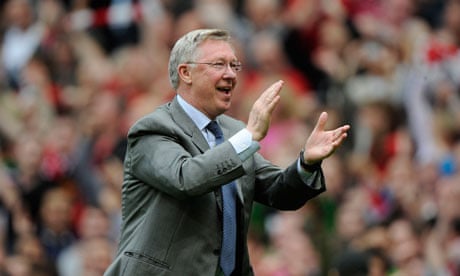Sir Alex Ferguson has lifted his ban on talking to the BBC after seven years of avoiding post-match interviews.
The Manchester United manager has not given interviews to the corporation since 2004 after a BBC documentary made allegations against his son, Jason.
Thursday's announcement followed a meeting between Ferguson and the BBC director general, Mark Thompson, and the director of BBC North, Peter Salmon.
A source close to the discussions said neither party had apologised but had agreed to put aside their differences and move on. "It wasn't about apologising, it was more a case of letting bygones be bygones, moving forward rather than dwelling on the past," added the source.
A statement on the Manchester United website said: "Sir Alex Ferguson and the BBC have decided to put behind them the difficulties which led to Sir Alex feeling unable to appear on BBC programmes.
"This follows a meeting between Sir Alex and the BBC's director general, Mark Thompson, and BBC North director Peter Salmon, and the issues have been resolved to the satisfaction of both parties.
"Sir Alex will now make himself available to the BBC for Match of the Day, Radio 5 Live and other outlets as agreed.
"No further comment will be made by either party on this issue."
Ferguson imposed a "lifetime ban" on the BBC in 2004 in protest at a TV documentary about his son, Jason, who was then working as an agent.
The Manchester United manager has said he would only speak to the corporation again if it apologised for the documentary, called Fergie and Son, which aired on digital channel BBC3 and was repeated on BBC1.
A meeting between Ferguson and the BBC's director general was brokered by Premier League chairman Sir Dave Richards earlier this year in a bid to end the feud.
The BBC has consistently said it would not apologise for the content of the documentary, leading to a seven-year impasse.
Three years after the documentary was broadcast, Ferguson said: "I think the BBC is the kind of company that never apologise and they never will apologise. They are arrogant beyond belief."
Under Premier League rules, Ferguson incurred a fine every time he refused to speak to the BBC.
Clubs are required to make players and coaching staff available to its contracted domestic rights holders, BSkyB and the BBC, which pour £1.8bn into Premier League clubs over three years. The BBC is believed to pay £170m for the rights to show highlights on BBC1's Match of the Day.
Viewers of Match of the Day and listeners to BBC Radio 5 Live have grown accustomed to Ferguson's absence from the airwaves, with assistant manager Mike Phelan standing in for the Manchester United boss.
Well known for his fiery temper, Ferguson has periodically imposed bans on virtually every media organisation at one time or another during nearly 25 years as Manchester United manager.
Sky Sports was banned for several weeks in 2003 after he was doorstepped by one of its reporters, and earlier this year he was caught on a microphone asking a club press officer to ban a journalist who asked a question about Ryan Giggs at a press conference.
After some Manchester United matches, Ferguson has avoided talking to journalists altogether, instead giving interviews to the club's official TV channel, MUTV.
Speaking about the ban last year, Match of the Day host Gary Lineker said: "It's a shame. We would like him to speak to us because we respect him and his teams, and always have done.
"It makes no difference to the programme because it's action-led. But it does make a difference to the Manchester United fans. They are the ones missing out. I get letters saying: 'We never hear from Sir Alex', and I have to explain. It's something he feels very strongly about, so what can you do?"
Manchester United's next Premier League game is against Arsenal on Sunday, which will be featured in BBC2's Match of the Day 2.
To contact the MediaGuardian news desk email editor@mediatheguardian.com or phone 020 3353 3857. For all other inquiries please call the main Guardian switchboard on 020 3353 2000. If you are writing a comment for publication, please mark clearly "for publication".
